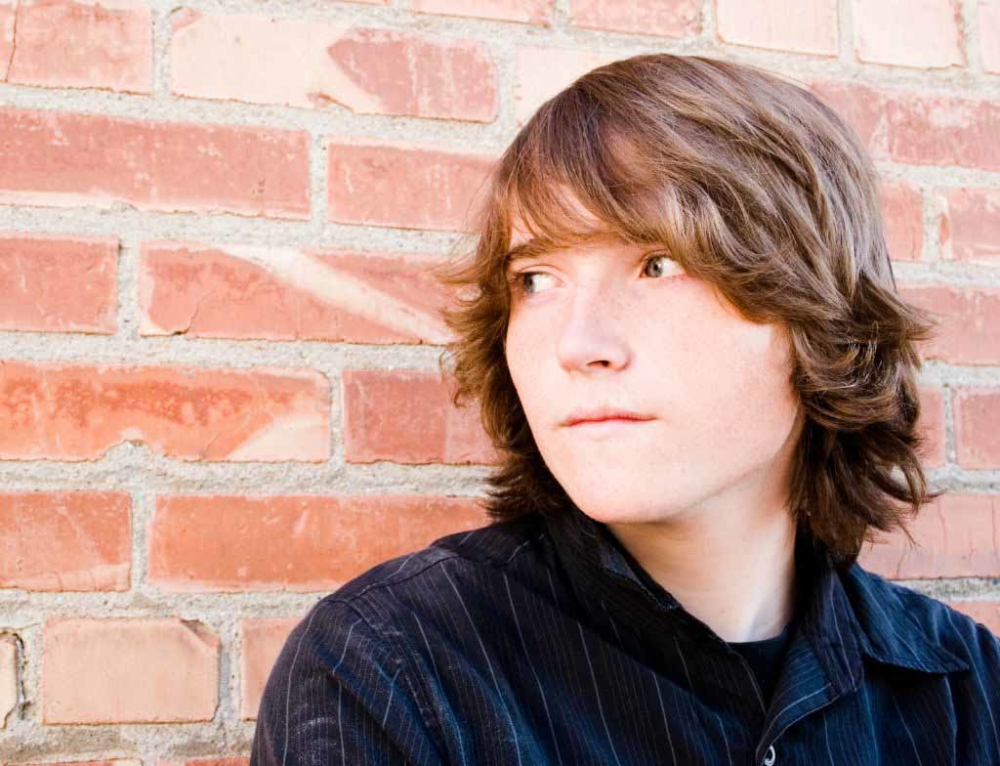During puberty, the testicles (testes or ‘balls’) start producing the male hormone testosterone. This hormone triggers the changes in a boy’s body.
Every boy is different, but below are some of the most common changes to look out for:
- Growth: Boys get taller, and develop muscle.
- Voice: The Adam’s apple (larynx) gets bigger and the voice begins to ‘break’ as the vocal cords grow quickly. The voice may go squeaky as a boy talks, but once the breaking process is finished, his voice will be deeper.
- Genitals: Change is gradual here, and it’s important for boys to realise that penises come in all shapes and sizes – and that a smaller penis fulfills its purpose just as effectively as a larger one. During puberty, changes occur in the testes as they begin to produce not only testosterone, but sperm. Testicles need to be kept cool for the sperm to develop normally, which is why they hang outside the body, in a sac called the scrotum. It is quite normal for a boy to have one testicle that is larger, or hangs lower, than the other.
- Wet dreams: Boys going through puberty can become sexually excited or aroused easily. They may ejaculate while asleep – this is called ‘nocturnal emissions’ or ‘wet dreams’. They may not remember the ejaculation at all. Unexpected erections during the daytime are also common.
- Pimples: The extra hormones in a boy’s body also affect the sebaceous (oil-producing) glands. Pimples are caused by over-activity of the sebaceous glands, which can clog the skin’s pores causing pimples. Inflamed pimples are known as acne. There is no single treatment for everybody.
- Sweat: In puberty, boys may sweat more. Encourage them to wash regularly, change clothes (including socks) regularly and use underarm deodorant.
- Hair growth: Boys will grow hair under their arms and around the pubic area. The hair will be fine and straight to begin with, and then get thicker and curlier as he gets older. Hair will also appear on his chin and upper lip.
- Mood swings: He may have mood swings and feel more emotional, but these feelings will settle over time.
How to talk to kids about puberty
As a parent, you are your son’s most reliable source of information about puberty. The key is to start talking to him when he’s young – well before when puberty actually starts.
It’s important to offer reassurance that the changes of puberty are normal.
What is puberty?
Apart from their first year of life, puberty brings the biggest period of growth and change in a child’s development. Puberty is the time when a young person’s sexual and reproductive organs mature.
What causes puberty?
Ready to be confused? There is a gene (GPR54) that lies dormant in our body until activated by kisspeptin (which comes from a gene called KiSS1). Once GPR54 is activated, it stimulates the brain to produce GnRH – a powerful hormone. GnRH causes other glands in the body, such as the testes in boys and ovaries in girls to release other hormones.
When does puberty occur?
Your child’s brain starts preparing for changes about two years before changes are actually noticed! Two parts of the brain called the hypothalamus and the pituitary gland start making a lot more of some hormones including growth hormones. These hormones act on other parts of the body to make the changes happen. Both boys and girls have these hormones, but they act on different parts of their bodies (see below). The physical changes of puberty begin later, when the body is ready to mature.
For boys, puberty can begin around 12 or 13 – but everyone is different.
Factors affecting age of puberty onset
Puberty changes can be affected by ethnic and geographic factors. A 2012 US study, for instance, found that African-American boys are more likely to enter puberty earlier (9.14 years) than Hispanic boys (10.4 years) or white boys (10.14).
A 2006 study published in the Journal of Epidemiology and Community Health also suggests that stress, particularly from parental separation or absentee fathers, plays a role in fast-tracking puberty.
Are children starting puberty earlier?
Puberty has been steadily falling for the past 150 years and has dropped three years within the past century, say researchers from Liverpool John Moores University Centre for Public Health.
Body weight appears to be the clearest link. The drop in the typical age of first period between the 1840s and the 1960s is largely attributed to improved nutrition and heavier bodies. Why this might be so is not known in absolute terms, but it is at least in part about the body recognising that enough body fat has accumulated to support a pregnancy.
While chemicals have been linked to the falling age at which breast development begins, evidence remains thin. Peter Gluckman, a renowned New Zealand paediatric biologist, isn’t even confident earlier breast development is real. “I’m not absolutely convinced by the data,” [he told the Sydney Morning Herald]. “In part, we have just got more sensitive about recording when breast development occurs.”
Read more:
- Teen party survival guide
- Surviving their first love
- Tackling teen acne
- Is your teen sexting?
- Teens and mobile phones







Leave A Comment
You must be logged in to post a comment.